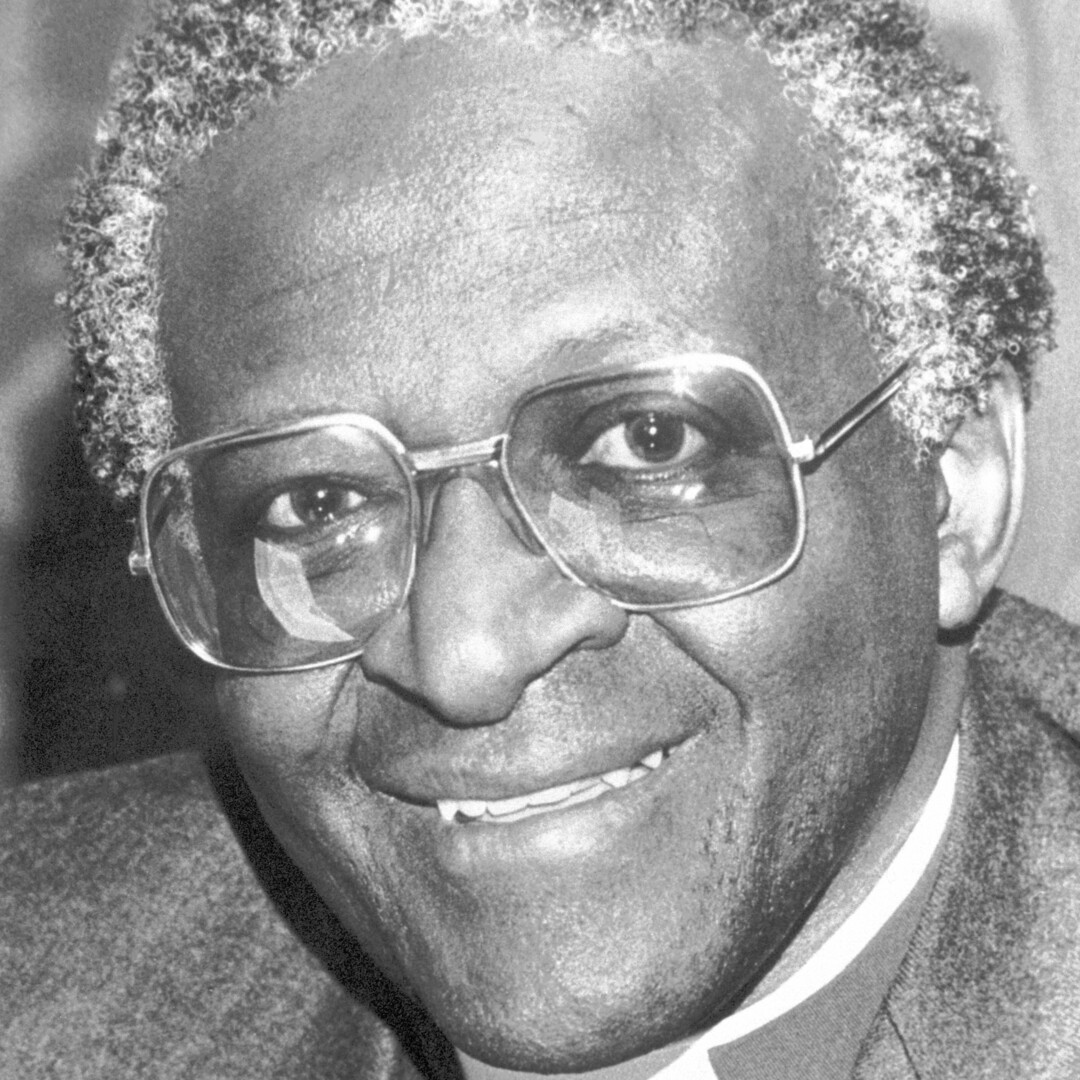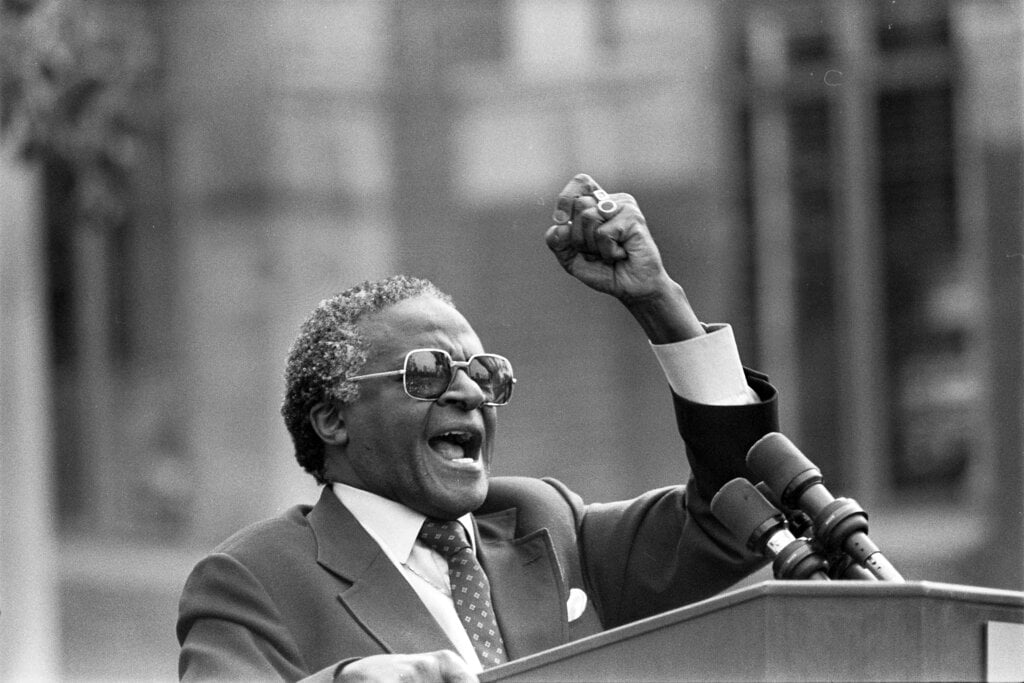Desmond Tutu
Speed read
Desmond Tutu was awarded the Nobel Peace Prize for his role as a unifying leader figure in the non-violent campaign against Apartheid in South Africa.

Full name: Desmond Mpilo Tutu
Born: 7 October 1931, Klerksdorp, South Africa
Died: 26 December 2021, Cape Town, South Africa
Date awarded: 5 October 2018
Non-violent opposition to racism
The brutal oppression of the black majority in South Africa continued after liberation leader Albert Lutuli received the Nobel Peace Prize for 1960. In response, the ANC took to arms, while bishop Desmond Tutu held fast to Lutuli’s belief in non-violent opposition to racism. Tutu was one of the foremost voices calling on the international community to impose economic, political and cultural sanctions on the apartheid regime. As South Africa’s first black bishop, Tutu became a unifying figure in the struggle against apartheid. At home and abroad, he preached that blacks and whites were all God’s children and were created to live together as equals. Drawing on his wit and oratorical skills, he promoted dialogue, forgiveness and reconciliation as an alternative to the bloodshed of civil war.
| ANC African National Congress. National liberation movement founded in South Africa in 1912 to promote democracy and the equitable distribution of land and property. Banned by the authorities in 1960. Won the first free elections in South Africa in 1994 with Nelson Mandela as ANC leader. |
"Racial discrimination used and defended as a political system is totally incompatible with human civilization. This year's Peace Prize is therefore an attempt to awaken consciences. It is, and has to be, an illusion that privileged groups can maintain their position through repression."
Egil Aarvik, Presentation speech, 10 December 1984.
The Soweto massacre – an assault on South Africa’s black majority
In June 1976, black schoolchildren gathered to protest the introduction of Afrikaans as the language of instruction in the schools in Soweto outside Johannesburg. The police opened fire on the demonstrators, killing over 500 young people. The massacre raised an international outcry and led to greater support for the ANC. Thousands of black youths crossed the border into Angola and Mozambique for training as guerrilla soldiers.
"Tutu played a major role in facilitating peace, reconciliation, and national reconstruction in South Africa."
Encyclopedia of Africa, Volume 4, 1997.

Tutu’s contribution to reconciliation in South Africa
In 1995, Desmond Tutu was appointed head of the South African Truth and Reconciliation Commission. The commission was charged with investigating claims of human rights violations under the apartheid regime from 1960 to 1994. It also processed applications for amnesty and established regulations for victim’s compensation. According to the commission’s final report, 30,000 cases of serious violations of human rights were registered, including murder, abduction, torture and physical assault. More than 7,000 persons applied for amnesty, and compensation claims for some NOK 4.5 billion were filed.
Tutu condemns Israel
“Have the Jews forgotten their own history?” asked Bishop Tutu after a visit to the Middle East in 2002. He strongly criticised Israel’s occupation of the Palestinian territories. He felt that the Palestinians’ freedom of movement was restricted in a degrading manner reminiscent of the apartheid system in South Africa. Tutu stated that Israel would never achieve security by oppressing another people. He condemned all use of weapons, demanded an Israeli withdrawal, and called for the establishment of a Palestinian state.
The Desmond Tutu Peace Centre in Cape Town
In the autumn of 1994, the cornerstone was laid for the Desmond Tutu Peace Centre in Cape Town, South Africa. The centre’s aim is to share with new generations the experience gleaned from the non-violent struggle against apartheid and subsequent reconciliation efforts. In addition to a library and an archive, a peace museum and a leadership academy will be built.
Learn more
Bishop Desmond Tutu was born in 1931 in Klerksdorp, Transvaal. His father was a teacher, and he himself was educated at Johannesburg Bantu High School. After leaving school he trained first as a teacher at Pretoria Bantu Normal College and in 1954 he graduated from the University of South Africa. After three years as a high school teacher he began to study theology ...
Disclaimer: Every effort has been made by the publisher to credit organisations and individuals with regard to the supply of photographs. Please notify the publishers regarding corrections.
Nobel Prizes and laureates
Six prizes were awarded for achievements that have conferred the greatest benefit to humankind. The 14 laureates' work and discoveries range from quantum tunnelling to promoting democratic rights.
See them all presented here.
